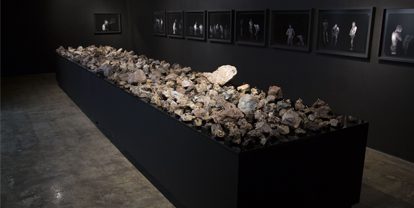Shadow
Mojtaba Amini
January 18 — February 08, 2019
Materials are formed by corrosion, time, and endurance. They are created with the passage of time, so they possess a time value, bearing traces of evolution. In his new exhibition, “Shadow,” Mojtaba Amini gives an account of the lives of the workers of turquoise and coal mine of Firuzabad. Exploring the usage of certain natural substances, he gives a personal narrative of materials, their inherent values, and how they have been particularly unbeneficial for the locals. “Shadow” is the story of refuge, solicitude, shadows as well as darkness, gloom, and inequity; the explorers of dark cavities and gemstones. For the people, the Nishabur turquoise mine is the equivalent of livelihood as well as divestment. The significance of labor for the local miners is not merely economic; it is rather a large part of social life of the region. Amini represents the challenges of the lives of miners in various ways and raises an issue: If the work is manual, then it results in the corrosion of the body.
Amini is an artist who criticizes the conditions and makes references to the political and social events in his work. If we categorize “Talqin” and “Xabt” under political criticism, “Children’s Program” is undoubtedly challenging regulations, and “Shadow” is expressing disapproval of social conditions. In “Shadows,” concepts pertaining to “corrosion,” “loss,” and “absence” are depicted in various forms and through different media: 1. “Yad” (lit. “Hand”) is a wide installation made of countless turquoise stones set on ring bands; 2. Uncouth collages are suspended amidst drawings and volumes; at times, they become contexts to words and in others cases they become settings for advertising posters for labor parties; 3. Appropriated images of miners that are submerged in darkness, wiping soot off their bodies; and finally, 4. “Forud” (lit. “Descent”) is a scale model of the mountains and hills that is the living environment of local miners. The installation recounts how nature treats the people of a land that do not benefit from living near mines. Their share is nothing but a flood that leaves their pockets empty: “… And showers fell from those rain clouds on the desert of Qabit until it blossomed; like a Yemeni merchant that spreads out his colorful goods on a table …” (Imru’ al-Qais)
